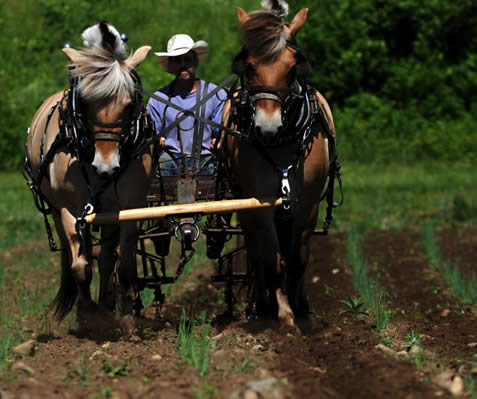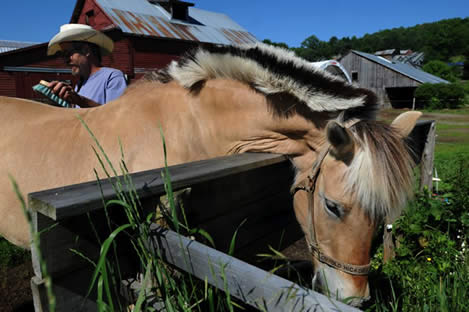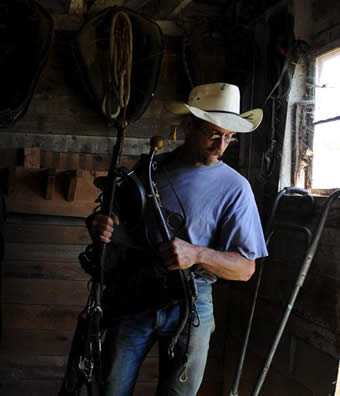
Horseytalk.net Special Interview
Stephen Leslie
 It was a good day to be a farmer. The rains had stopped, the sun beat down, the sky was clear and Stephen Leslie’s team of Norwegian Fjord horses was impatient to work. Leslie hitched Cassima, 18, and Tristan, 15, to a McCormick-Deering straddle row cultivator built sometime, he estimated, between the two world wars. “It’s really well built, and built to last,” Leslie said as he stood on a small side road at Cedar Mountain Farm in Hartland, Conn., which he runs with his wife Kerry Gawalt.
It was a good day to be a farmer. The rains had stopped, the sun beat down, the sky was clear and Stephen Leslie’s team of Norwegian Fjord horses was impatient to work. Leslie hitched Cassima, 18, and Tristan, 15, to a McCormick-Deering straddle row cultivator built sometime, he estimated, between the two world wars. “It’s really well built, and built to last,” Leslie said as he stood on a small side road at Cedar Mountain Farm in Hartland, Conn., which he runs with his wife Kerry Gawalt.
Perching himself on the seat of the cultivator, which looks like a harness-racing sulky, Leslie adjusted his feet to the pedals that control the movement of the blades, or shovels, that pull through the soil. “If a row of crop is crooked, I can steer with those pedals to account for that variation,” he said. With a small flick of the reins, he urged the horses forward. As Leslie drove the team down a field of onions planted in orderly lines, the shovels cut arrow-straight furrows on either side of the rows. This eliminated the weeds and aerated the soil, giving it a friable texture that helps to retain moisture.
Cassima and Tristan trotted briskly at a speed no slower than that of a small tractor, their harnesses and bridles jingling as gently as coins in a pocket. A slight wind ruffled their manes. Their legs pumped up and down in unison as if they were on parade. There was no smell of diesel, no rumbling tractor, only the singing of birds in the distance, and Leslie’s soft-spoken commands as he wheeled the team around to make the next turn down the field.
An ancient breed that dates back to the Vikings, the Fjords have an average life expectancy of 30 years. Their coats are the color of wheat, and they have a compact but powerful build, weighing about 950 pounds each. As a team, the horses are equivalent to a 20-horsepower tractor, have more finesse than machines, and can work as quickly and efficiently as any smaller tractor, Leslie said.
Leslie describes the benefits of using draft horses in The New Horse-Powered Farm: Tools and Systems for the Small-Scale, Sustainable Market Grower , recently published by Chelsea Green in White River Junction. He and Gawalt live with their 6-year-old daughter Maeve Leslie-Gawalt at Cobb Hill Cohousing, up the hill from Cedar Mountain Farm.
In return for a free lease on 60 acres (35 acres of hill pasture, 20 acres of hay and five acres of market garden and greenhouses) that belong to Cobb Hill Cohousing, Leslie and Gawalt own the farm business. The couple also have a herd of Jerseys whose milk goes into Cobb Hill cheese and other dairy products.Themarket garden is run entirely with horse power, but Leslie still uses a tractor from time to time working with the cows.
“I became an organic farmer because I was really concerned about the environment,” Leslie said. How farmers treated labor was another concern. Using horses “dovetailed completely with my idea of organic farming,” he said.
 The book is aimed, Leslie said, at both the beginner, who wants to get into horse-powered farming but has no practical experience, and the small farmer who already has a market garden or CSA, but wants to shift from machine-driven farming to horse power. “It seems to me there is a renaissance of small farmers in Vermont and New England,” Leslie said.
The book is aimed, Leslie said, at both the beginner, who wants to get into horse-powered farming but has no practical experience, and the small farmer who already has a market garden or CSA, but wants to shift from machine-driven farming to horse power. “It seems to me there is a renaissance of small farmers in Vermont and New England,” Leslie said.
What’s old — horse-powered farming — is, in the hands of a younger generation of farmers, new again. Lynn Miller, the editor of Small Farmer Journal in Oregon, for which Leslie has written articles on horse-powered farming, wrote in an email that perhaps 400,000 farmers in North America, 90 percent of them younger people, now work with horses. This number includes such communities as the Amish, who have traditionally eschewed modern technology and have used horses in farming for generations, Leslie said.
Miller expects the number of farmers using horses to increase dramatically, perhaps even triple, around the world over the next 20 years. Of course, 400,000 farmers is still a small percentage of a small percentage: between one and two percent of the U.S. population are farmers.
But for a farmer like Leslie, working with horses has proved to be, in some ways, easier and more beneficial than using heavy farm equipment. During the growing season, Leslie uses his team of horses to plow and cultivate, and rake and ted, or shake out and loosen, hay at least five days a week. “Horses don’t compact the soil the way a tractor does. They distribute their weight differently,” Leslie said.
Although, at 14 hands, the horses are technically draft ponies, they can work together or singly, depending on the job. “None of the equipment is scaled down for them. On the scale we’re working the horses have no problem pulling,” Leslie said.
The book is also about the delicate and complex bond between human and horse that Leslie has chosen to pursue, rather than relying solely on tractors and the fossil fuel that makes them run. “You can imagine for me it’s a completely different aesthetic experience. … It’s a real relation with us as individuals,” he said.
Raised in Salem, N.H., Leslie had no experience with horses until well after college when, at age 31, he became an apprentice at a farm in Ghent, N.Y., where he met Kerry. Before that he’d spent seven years at the Weston Priory in Vermont, “exploring becoming a monk.” There he learned about community farming and development in Latin America, which sent him in the direction of farming as a profession, and avocation, which in turn put him on the path to Hawthorne Valley Farm in Ghent. It was there that he began exploring the idea of farming with horses.
“I fell in love with those horses and became intrigued by that relationship. You’re working with a living, breathing, intelligent animal,” he said.
 After a short stint on a mule and horse ranch in Idaho, Leslie and Gawalt eventually moved to the Upper Valley where they met and forged a connection with the late Donella Meadows, a longtime professor of environmental studies at Dartmouth, author of The Limits to Growth and a former columnist for this newspaper. At the time Meadows had land in Plainfield, where Leslie and Gawalt started a market garden. But the plans for Cobb Hill Cohousing were already in development and after three years in Plainfield, Leslie and Gawalt moved in 1999 across the Connecticut River to Hartland. It was then that Leslie began working in earnest to shift to horse-powered farming. It was a long process.
After a short stint on a mule and horse ranch in Idaho, Leslie and Gawalt eventually moved to the Upper Valley where they met and forged a connection with the late Donella Meadows, a longtime professor of environmental studies at Dartmouth, author of The Limits to Growth and a former columnist for this newspaper. At the time Meadows had land in Plainfield, where Leslie and Gawalt started a market garden. But the plans for Cobb Hill Cohousing were already in development and after three years in Plainfield, Leslie and Gawalt moved in 1999 across the Connecticut River to Hartland. It was then that Leslie began working in earnest to shift to horse-powered farming. It was a long process.
“It took nine years before I felt really confident,” Leslie said. For people who want to work with horses, he recommends “finding a good mentor or apprentice to a seasoned team. I wouldn’t recommend not knowing much, as we did, and working with a young team.”
The horses have taught him as much as he has taught him. “They taught me patience, humility, and the ability to control my anger, because it never does any good to yell at them.”
The Fjords can do heavy work until about age 20, at which point they shift to lighter loads. By their mid-20s, they work only fitfully, and Leslie foresees a “dignified retirement” out at pasture. He affectionately patted Cassima, his lead horse. “She’s been such a faithful companion,” he said. “No glue factory for you, Cassima.”
Interview by Nicola Smith - Valley News Staff Writer: sourced from www.vnews.com




